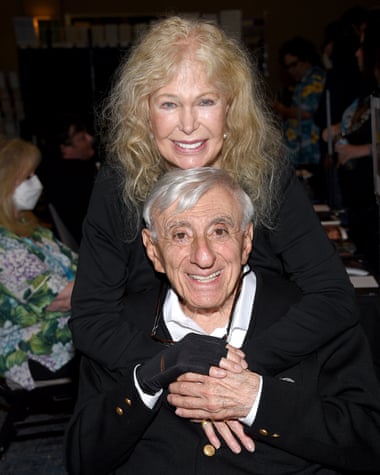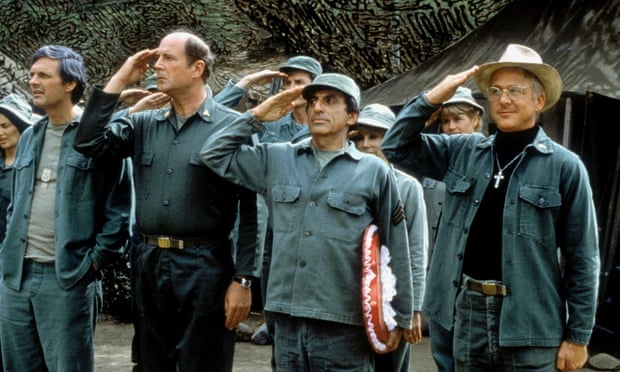When I was a kid, M*A*S*H was always on television. Every time we switched on the TV, somehow, improbably, M*A*S*H was just … there. Like water, it filled every crack and crevice. And, like water, I took it for granted and really should have consumed more of it.
Robert Altman’s acerbic anti-war film, on which the show was based, was itself a kick-in-the-guts adaptation of former military surgeon H Richard Hornberger’s book. But while Hornberger’s politics gradually swung further to the right, like some kind of furious conservative windsock, the politics of M*A*S*H veered firmly towards the left. Then they went and made a sitcom out of it.
And that’s all I thought M*A*S*H was. A sitcom! Gauzy shots of stooped actors delivering shlocky jokes while a laugh track – and Korean forces – bombarded us in tandem. Alan Alda mugging in a Hawaiian shirt. Someone called “Hot Lips”. I didn’t get it. How could I? I was a kid. All I knew was that if I turned the TV on a minute too early for The Simpsons, I’d catch some dumb joke delivered by a goon holding a martini, a cheesy freeze-frame, and huge, yellow letters stamping themselves across the screen. So I ignored it.
Jump ahead to lockdown. My wife justifiably started needling me after learning I had never properly watched M*A*S*H. So … we binged the whole damned thing. Eleven seasons. And while there were moments of comic brilliance over the first season that captivated me, some time during season two, M*A*S*H began to morph into prestige television. I was appalled to realise that I could have watched this absolute work of art years ago.
M*A*S*H feels current, shockingly so. The crew of the 4,077th are, for the most part, young, idealistic and tired. Increasingly disillusioned by the chaos of war, the waste of life, the shitty decisions of the government and the pointlessness of it all, these doctors and nurses attempt to distract themselves any way they can. They’re beautiful souls trapped in a galling situation and they somehow manage to carry on in spite of it all.
“Everything about M*A*S*H is relevant, today, tomorrow and yesterday,” says Loretta Swit, who played Margaret Houlihan, arguably the series’ best and most complex character. “That was the magic of M*A*S*H. It was based on truth, honesty and relevance … I mean, the show was set in the 50s, in Korea, and it was shot in the 70s and the 80s, but everything about it is relevant today.”
As with modern prestige TV, the core cast of M*A*S*H change, leave or are killed off entirely. The story becomes a living, breathing saga that is impossible not to be deeply invested in. Characters grow and evolve, shaped by the war unfolding around them. This might seem inconsequential, but in ye olde sitcom world, stasis was the status quo. M*A*S*H didn’t care if you were up to speed. If the surgeons of the 4,077th didn’t get a moment to breathe and figure out exactly what was going on, why should you? Keep up, dammit. Choppers incoming.

Houlihan is a particular standout in this regard. She goes from two-dimensional to a fully realised person, changed by her experiences. “She was being used as comic relief,” Swit tells me. “And that was unfair to Margaret, her status, her ability, her potential. So the writers, well, they had their hands full with me. I’d say, ‘but Margaret wouldn’t do that’. And the idea of having her in that mode for the entire run, I said, ‘I can’t do that, fellas. I don’t know how to stay there as a cardboard cutout and I just can’t do it. Can’t do it to the character and I can’t do it to me. She’s gotta be real – Margaret is real to me. I mean, she’s the best damned head nurse in Korea.’”
There are some moments in M*A*S*H that are downright experimental. Artful shots, long takes, episodes built entirely around high-concept premises that constantly challenged audiences. Once Alda, who played Capt Benjamin “Hawkeye” Pierce, came into his own as a writer, director and creative voice, the show got smarter and smarter, accelerating towards a blindingly profound and heartfelt conclusion. Impossibly, it became better and better, all the way up to its final scintillating moments.
“Paul, I could go on and on,” Swit says. “M*A*S*H will always be my favourite subject. But working with our cast and that crew – that was, for as an actor, dying and going to heaven.”

